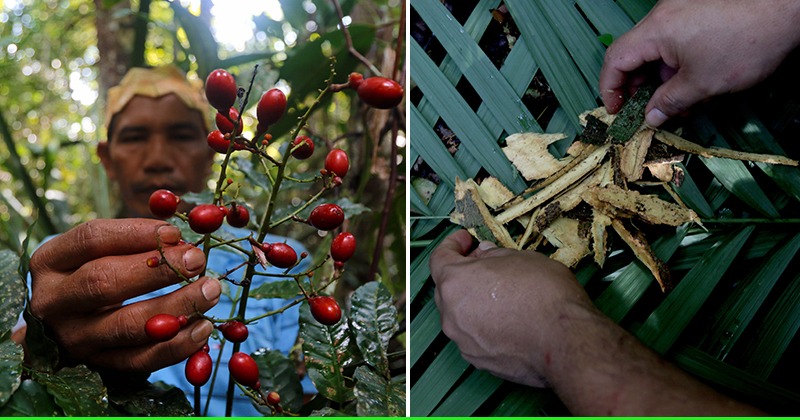The death toll in the 40 indigenous groups in Brazil has crossed 100, with around 530 confirmed positive cases of coronavirus. Most of the cases are in the remote Brazilian Amazon, where communities are located far from the word of labs and PPEs. Experts, citing the vulnerability of indigenous peoples to outside disease, worry the pandemic could result in many more deaths. A group of indigenous healers is working its way up the Amazon river, looking for medicinal plants to treat the virus. The healers belong to the Satere Mawe tribe that live in northwestern Brazil in the far reaches of the Amazon forest.
36-year-old Mawe indigenous, mother Priscila Tavares Batista, remains in a bed protected by a mosqui… Read More
36-year-old Mawe indigenous, mother Priscila Tavares Batista, remains in a bed protected by a mosquito net with her 2-year-old son, Jone Tavares, after being treated with medicinal herbs. She showed symptoms of COVID-19. She’s located in the Wakiru community, in Taruma neighbourhood, a rural area west of Manaus, Amazonas State, Brazil.
Read Less22-year-old Mawe indigenous, Denilson Tavares Batista, who has been treated with medicinal herbs aft… Read More
22-year-old Mawe indigenous, Denilson Tavares Batista, who has been treated with medicinal herbs after showing symptoms of COVID-19. The Satere Mawe, an ethnic group of about 13,000 people, live mainly in the Andira-Marau indigenous reserve.
Read Less16-year-old Satere-Mawe indigenous girl, Deniane Tavares Batista, lies in a hammock after being trea… Read More
16-year-old Satere-Mawe indigenous girl, Deniane Tavares Batista, lies in a hammock after being treated with medicinal herbs after showing symptoms of COVID-19. The virus has infected 40 indigenous groups, with 537 positive cases and 102 deaths, according to the Brazilian Indigenous Peoples.
Read Less
A couple from Satere-Mawe indigenous prepare medicinal herbal tea made from the bark of the carapanauba tree
to treat people with symptoms of COVID-19 in the Wakiru community.
A Satere-Mawe indigenous child sits beside a man who is preparing medicinal herbs to treat people with symptoms of COVID-19.
43-year-old Satere-Mawe indigenous leader Valdiney Satere collects caferana, a native plant of the Amazon rainforest used as a medicinal herb, to treat people showing symptoms of the novel coronavirus COVID-19 in their community.
A Satere-Mawe indigenous girl hugs a sloth in the Wakiru community, in Taruma neighbourhood, a rural area west of Manaus, Amazonas State, Brazil.
Satere-Mawe indigenous leader Andre Satere collects medicinal herbs such as carapanauba, caferana and saratudo, all native plants of the Amazon.
The Satere Mawes’ remedies include teas made from the bark of the carapanauba tree, which has anti-inflammatory properties; from the saracuramira tree, an anti-malarial; and ingredients such as mango peel, mint and honey.
The traditional remedies work, according to villagers who are suspected to be infected with coronavirus causing COVID-19.

